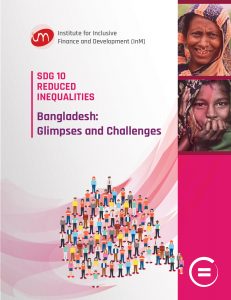
 In the world, richest 85 people own as much as the poorest half of humanity. In Bangladesh, the lowest 5 percent population has an income share 0.23 percent in 2016 (declining from 0.78 percent in 2010); while the income share of the top 5 percent households has increased to 27.89 percent in 2016, rising from 24.61 percent in 2010. The gap between the rich and the poor is getting wider.
In the world, richest 85 people own as much as the poorest half of humanity. In Bangladesh, the lowest 5 percent population has an income share 0.23 percent in 2016 (declining from 0.78 percent in 2010); while the income share of the top 5 percent households has increased to 27.89 percent in 2016, rising from 24.61 percent in 2010. The gap between the rich and the poor is getting wider.
Inequality fuels crime, corruption, poverty and many other evils in society. SDG10 is essential for achieving the country’s desired goal of becoming a developed nation by 2041 and creating a better world for the future generations.
The government has the main responsibility for promoting equality in society, since inequality stems from structural conditions. An equal society is based on the principle of equal rights of all people regardless of gender, ethnicity, religion or belief, disability or origin, which also serves as a basis for an equitable distribution of resources, and economic and political influence in society.
Inequality is also a matter of disparities related to access, opportunities, resources and the ability to contribute to and make use of potential/emerging development opportunities. This is true at all levels; from differences in opportunities to individuals, specific social groups and geographic regions. Inequality tends to perpetuate poverty since extreme poverty in different dimensions makes it more difficult for people and society to benefit from development. Inequality is often a matter of inequitable access to resources and utilities, such as access to clean water and hygienic sanitation; and is therefore also a source of deprivation.
The issue of inequality is linked to most other SDGs. Quality lifelong learning for all is the key to building a democratic society and promoting social and gender equality. Equitable access to health services and to conditions that ensure good health also promote good quality of life and create opportunities for people to support themselves, including people with limited resources. Clear regulations on ownership, sale and inheritance of land that cover both women and men and different groups in society form the basis of sustainable use of natural resources and food security. Gender equality and empowerment of women and girls are keys to achieving greater equality in society. Peace and freedom from all forms of violence are essential to building sustainable societies in which all individuals and social groups can use their productive abilities to the maximum extent for enjoying greater social welfare and inclusive development.
